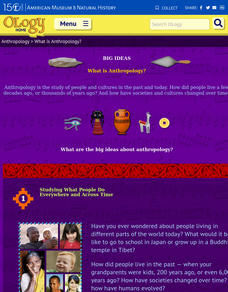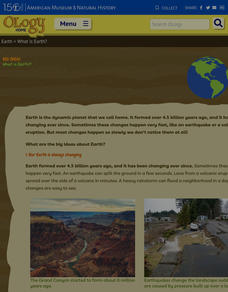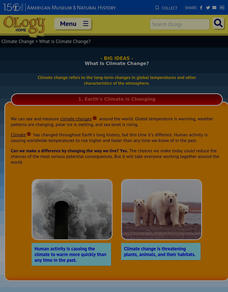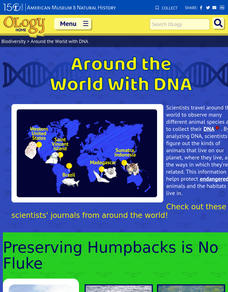American Museum of Natural History
What's This?: Early Humans
Early humans crafted shelters out of whatever materials they could find. A one-question quiz asks learners to identify the type of bones used to construct the hut pictured in a display.
American Museum of Natural History
What is Anthropology
A colorful resource introduces learners to the four major fields of anthropology: cultural anthropology, linguistic anthropology, biological anthropology, and archaeology. Explanations are provided for what each field studies, the kinds...
American Museum of Natural History
What is Earth?
Humans have only inhabited Earth for a short part of its existence. An online resource explains how scientists use clues from rocks and fossils to piece together information about Earth prior to humans. The online instruction includes...
American Museum of Natural History
What's This?: Mythic Creatures
Fantastic beasts, and where to find them, are featured in a resource that offers images of real animals that just might have given rise to some of mythic creatures of legend.
American Museum of Natural History
What's This? Reproduction
Attracting the right mate is as important for humans as any other species. An interesting lesson teaches individuals about several strategies that animals and plants have adapted to attract their mates. From colorful nests to powerful...
American Museum of Natural History
What's the Big Deal About Paleontology?
Paleontologists could be considered detectives of the past. A quick online lesson describes the science of paleontology and the importance of fossils. Young scientists read about how paleontologists analyze the features of fossils to...
Curated OER
Climate Change
Rising sea levels, strong storms, melting ice ... who or what is to blame? Scholars browse the website in preparation for a class discussion or debate about whether human activity is causing climate change. They gain a balanced...
ProCon
Vegetarianism
What do Mike Tyson, Ellen DeGeneres, and Paul McCartney have in common? They're all famous vegetarians. Using the resource, scholars learn about the pros and cons of eating a vegetarian diet. They read a fascinating history of...
American Museum of Natural History
What Is Climate Change?
So many factors show that climate change has arrived. Learners read through an online resource that explains the data and the consequences of climate change. They also review strategies for slowing or even reversing the global influence.
American Museum of Natural History
What's This? Leeches
Who actually likes leeches? Meet a scientist that makes his living letting leeches feed on him. Pupils learn about the characteristics of leeches and different variations of the species. The lesson works as a remote learning resource or...
American Museum of Natural History
What's the Big Deal About Water?
It may seem simple, but water is one of the most unique substances on Earth. An interactive online lesson describes its properties and importance in so many different situations. Learners interact with the lesson to learn the role water...
University of North Carolina
Psychology
Psychology, the scientific study of the human mind and behavior, is a popular major for many college students. An informative handout outlines common assignments in psychology courses. Scholars see how to design a research proposal,...
American Museum of Natural History
Around with World with DNA
A mammalogist, ornithologist, ichthyologist, and a conservation geneticist share their work and their hopes that their research will help protect and save endangered species and their habitats.
University of North Carolina
Anthropology
Anthropologists ask the question that everyone wants answered: what does it mean to be human? An online handout provides a brief introduction to the study of anthropology and outlines three common types of anthropology writing...
American Museum of Natural History
Being a Zoologist: Sandra Olsen
Are your students wild about horses? Then introduce them Sandra Olsen, a zooarchaeologist, who has been studying horses and the people who herd them. Ms Olsen responds to 15 interview questions and details how she goes about her...
ProCon
Milk
Milk: It does a body good ... or does it? Using the provided website, scholars sort through information to answer the question. They review a chart demonstrating lactose intolerance by ethnicity and region, and they also compare the...
American Museum of Natural History
Trip Up Your Brain
Sometimes different parts of the brain disagree. See what this disagreement looks like using a remote learning resource to experience how brains often take shortcuts. Pupils complete the activity, observe their results, and then read...
American Museum of Natural History
Talking to Fireflies
Fireflies are more than just mobile twinkle lights. An online interactive lesson teaches individuals about the light patterns fireflies use to communicate with each other. After they practice the patterns themselves, they could be...
University of North Carolina
Communication Studies
A degree in communications incorporates disciplines such as business, law, and media as well. A writing handout offers prospective communications majors information about what kind of assignments to expect in a typical course....
American Museum of Natural History
Around the World with DNA
DNA analysis could be what saves some animals from extinction. An interactive lesson shows learners how DNA information proves variation among animals of the same species and how stakeholders use that information to make decisions. Easy...
University of North Carolina
Argument
What elements make up a successful argument? A helpful resource describes aspects of an argument such as the claim, evidence, counterargument, and audience. Perfect as an individual assignment for a flipped lesson or collaborative work,...
National Constitution Center
Interactive Constitution
Did you know there are seven Articles and 27 Amendments to the US Constitution? Explore each and every one of them, including the Bill of Rights and other rights around the world, in a super neat US Constitution interactive.
American Museum of Natural History
Ask a Scientist About Our Environment
Scientists respond to 26 question posed by learners. These experts answer in easy to understand language, include photos to illustrate the issue, offer suggestions for how young people can make a difference, and supply links to resources...
Curated OER
Bermuda Triangle
Young scholars explore what the Bermuda triangle is and the theories as to why it is so mysterious. In this mystery lesson students read and discuss the history and the mystery behind the Bermuda Triangle.

























